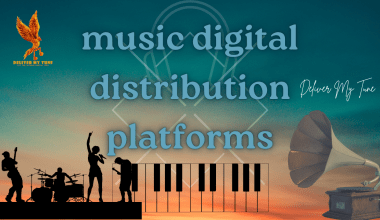In the music industry, understanding the technical aspects of music distribution is crucial for artists, producers, and labels. Two essential components in this realm are the ISRC (International Standard Recording Code) and the UPC (Universal Product Code). Both of these codes play vital roles in identifying and tracking music, but they serve different purposes and are used in various contexts. This blog will delve into what ISRC and UPC codes are, their differences, and how to obtain them for your music. By the end, you’ll have a clear understanding of ISRC vs UPC and how they can benefit your music career.
What is an ISRC Code?
The International Standard Recording Code (ISRC) is a unique identifier for sound recordings and music video recordings. It acts as a digital fingerprint for your music, allowing for easy tracking and management across various platforms and services.
Purpose of ISRC
The primary purpose of the ISRC code is to uniquely identify individual sound recordings and music videos. This unique identification enables accurate tracking of usage and royalty payments. The ISRC is used by various stakeholders in the music industry, including record labels, rights organizations, and digital music platforms, to ensure that the correct rights holders are compensated.
Structure of ISRC
An ISRC code consists of 12 characters, divided into four parts:
- Country Code: The first two characters represent the country of the registrant (e.g., ‘US’ for the United States).
- Registrant Code: The next three characters identify the registrant, usually assigned by a national ISRC agency.
- Year of Reference: The following two characters represent the year in which the ISRC code was assigned (e.g., ’23’ for 2023).
- Designation Code: The final five characters are unique to each recording or video, assigned by the registrant.
Example Copy codeUS-ABC-23-12345
What is a UPC Code?
The Universal Product Code (UPC) is a barcode used primarily for retail purposes. It helps in identifying and tracking products in the marketplace, including physical and digital music products.
Purpose of UPC
UPC codes are essential for managing the sale and distribution of products, including music albums and singles. They facilitate inventory management, sales tracking, and reporting in retail environments. UPC codes are also used in digital storefronts to ensure that products are correctly listed and tracked.
Structure of UPC
A UPC code typically consists of 12 digits, which include the following components:
- Company Prefix: The first six to nine digits are the company prefix, assigned by GS1.
- Item Reference: The next two to five digits identify the specific product.
- Check Digit: The last digit is a check digit used for error detection.
Example Copy code012345678905
Differences Between ISRC and UPC Codes
Understanding the differences between ISRC and UPC codes is essential for effective music distribution and management.
ISRC vs UPC
- Purpose:
- ISRC: Identifies individual tracks or recordings.
- UPC: Identifies complete products (albums, singles).
- Use Cases:
- ISRC: Used for digital tracking, royalty management, and reporting to rights organizations.
- UPC: Used for retail tracking, inventory management, and sales reporting.
- Assignment:
- ISRC: Assigned by a registrant (e.g., record label, distributor).
- UPC: Obtained through GS1 or resellers for commercial products.
- Format:
- ISRC: 12 characters (alphanumeric).
- UPC: 12 digits (numeric).
How to Get ISRC and UPC Codes for Music
Securing ISRC and UPC codes is a critical step in preparing your music for distribution. Here’s a step-by-step guide on how to obtain these codes.
Getting ISRC Codes
- Register with an ISRC Agency: Contact your local ISRC agency to become a registrant. Each country has a designated ISRC agency that manages the assignment of registrant codes. Once you become a registrant, you can generate ISRC codes for your recordings.
- Assign Codes: Once registered, you can assign ISRC codes to your recordings. It’s important to keep a detailed record of the codes you assign, including the associated metadata (e.g., track title, artist, release date).
- Use a Distributor: Many music distributors provide ISRC codes as part of their services. If you’re using a distribution service, check if they offer ISRC code assignment. This can simplify the process, especially if you’re distributing a large catalog of music.
Getting UPC Codes
- Register with GS1: GS1 is the global standards organization responsible for UPC codes. Registering with them will allow you to obtain a company prefix, which is necessary for generating UPC codes for your products.
- Purchase Codes: Buy UPC codes through GS1 or authorized resellers. GS1 offers different packages based on the number of UPC codes you need. Authorized resellers can provide UPC codes if you don’t require a large number of them.
- Assign to Products: Assign UPC codes to your albums or singles. Like ISRC codes, it’s crucial to maintain detailed records of the UPC codes you assign, including product details and associated metadata.
Importance of ISRC and UPC Codes
Both ISRC and UPC codes play pivotal roles in the music industry. They ensure that your music is easily identifiable, trackable, and manageable across various platforms.
Benefits of ISRC Codes
- Royalty Tracking: ISRC codes help in accurately tracking and managing royalties from streaming services, radio plays, and other uses. By associating each recording with a unique ISRC, rights organizations can ensure that the correct royalties are paid to the correct parties.
- Rights Management: They simplify the process of managing and reporting to rights organizations. ISRC codes are used in various reporting systems, making it easier to track the use and distribution of your music.
- Global Recognition: ISRC codes are recognized worldwide, making them essential for international distribution. Whether your music is played on a radio station in the US or streamed on a platform in Japan, the ISRC ensures it is tracked and reported consistently.
Benefits of UPC Codes
- Retail Management: UPC codes facilitate inventory management and sales tracking in retail stores. They help retailers manage stock levels, track sales performance, and reorder products as needed.
- Digital Sales: They are necessary for listing your music on digital stores and platforms. Without a UPC, your music may not be accepted by major digital retailers like iTunes and Amazon.
- Professionalism: Having UPC codes on your products adds a level of professionalism and credibility. It shows that you are serious about your music career and ensures that your products are ready for commercial sale.
Common Questions About ISRC and UPC Codes
What is an ISRC?
An ISRC (International Standard Recording Code) is a unique identifier for a specific sound recording or music video. It helps in tracking and managing music across various platforms and services.
What is a UPC?
A UPC (Universal Product Code) is a barcode used primarily for retail purposes, identifying and tracking products like albums or singles sold as a unit.
How do I get ISRC codes?
You can obtain ISRC codes by registering with a local ISRC agency or through music distributors that offer ISRC assignment services.
How do I get UPC codes?
UPC codes can be purchased through GS1 or authorized resellers. You will need to register with GS1 to obtain a company prefix before buying UPC codes.
Can I reuse ISRC or UPC codes?
No, ISRC codes are unique to each recording and cannot be reused. Similarly, UPC codes are unique to each product and should not be reused.
Detailed Steps for Getting ISRC and UPC Codes
ISRC Code Assignment Process
- Become a Registrant: Start by contacting your local ISRC agency to apply for a registrant code. Each country has its own ISRC agency, and you can find a list of agencies on the official ISRC website.
- Assign ISRC Codes: Once you have your registrant code, you can begin assigning ISRC codes to your recordings. Use a systematic approach to ensure that each recording receives a unique code. Keep a detailed record of each ISRC code and the corresponding recording information.
- Embed ISRC Codes: After assigning the ISRC codes, embed them into the metadata of your digital audio files. Most digital audio workstations (DAWs) and mastering software allow you to enter ISRC codes into the metadata of your audio files.
UPC Code Assignment Process
- Register with GS1: Visit the GS1 website and register to obtain a company prefix. This prefix will be unique to your company and will be used in all UPC codes you generate.
- Purchase UPC Codes: Once you have your company prefix, you can purchase UPC codes. GS1 offers different packages based on the number of UPC codes you need. Choose a package that fits your requirements.
- Assign UPC Codes to Products: Assign the purchased UPC codes to your music products. Ensure that each album or single has a unique UPC code. Keep detailed records of each UPC code and the corresponding product information.
Importance of Accurate Metadata
Both ISRC and UPC codes rely heavily on accurate metadata. Metadata includes information such as the track title, artist name, album title, and release date. Ensuring that your metadata is accurate and up-to-date is crucial for effective tracking and management of your music.
Benefits of Accurate Metadata
- Efficient Royalty Collection: Accurate metadata ensures that royalties are correctly attributed to the right tracks and recordings. This helps in maximizing your revenue from streaming services, radio plays, and other sources.
- Better Discoverability: Proper metadata makes it easier for listeners to find your music on digital platforms. It also helps in categorizing your music correctly, improving its visibility in search results and playlists.
- Professionalism: Accurate metadata reflects professionalism and attention to detail. It shows that you take your music career seriously and are committed to maintaining high standards.
Challenges in Managing ISRC and UPC Codes
While ISRC and UPC codes are essential for music distribution, managing them can be challenging, especially for independent artists and small labels. Here are some common challenges and tips for overcoming them:
Common Challenges
- Complexity: Understanding the structure and purpose of ISRC and UPC codes can be complex, especially for newcomers to the music industry.
- Record-Keeping: Maintaining detailed records of assigned ISRC and UPC codes, along with corresponding metadata, can be time-consuming.
- Cost: Registering with GS1 and purchasing UPC codes can be expensive, particularly for independent artists with limited budgets.
Tips for Overcoming Challenges
- Educate Yourself: Take the time to learn about ISRC and UPC codes, their structures, and their purposes. There are many resources available online, including official websites and industry guides.
- Use Software Tools: Consider using software tools and databases to manage your ISRC and UPC codes. These tools can help automate the record-keeping process and ensure accuracy.
- Budget Wisely: Plan your budget to include the costs of obtaining ISRC and UPC codes. Consider these expenses as investments in your music career, as they are essential for professional distribution and management.
Conclusion
Understanding the roles and differences between ISRC and UPC codes is crucial for anyone involved in the music industry. Whether you’re an independent artist, a label, or a producer, these codes help in effectively managing, distributing, and tracking your music. By ensuring your music has the correct ISRC and UPC codes, you can streamline royalty tracking, enhance your professional image, and ensure that your music reaches a global audience efficiently.
For further reading, explore these related articles:
- What is YouTube Content ID: A Comprehensive Guide
- What is Facebook Audio Library: An Essential Resource for Content Creators?
- How to Get Your Song Copyrighted?
For additional resources on music marketing and distribution, visit Deliver My Tune.






